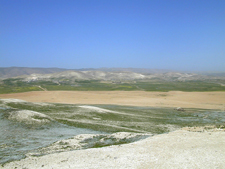|
BACKGROUND
PRAISE
Worship
Worshipper
WORSHIP
Prayer
PRAYER
Fast
FASTING
Tithe
TITHES
Gift
GIFT
The
full background to this teaching is available online at this link
Click Here
|
Online links to scriptures (New International Version [NIV] unless otherwise stated) are shown in blue
| PRAYER AND FASTING |
|
 “Why combine these two,†I hear you ask. The one I love! The other I hate! A bit of an exaggeration, but you get the idea. Yet together, they fit into the true Christian lifestyle in a similar way that praise does with worship. And no, it is not just an Old Testament concept. For example, in the appointing of elders. “Why combine these two,†I hear you ask. The one I love! The other I hate! A bit of an exaggeration, but you get the idea. Yet together, they fit into the true Christian lifestyle in a similar way that praise does with worship. And no, it is not just an Old Testament concept. For example, in the appointing of elders.
Acts 14:23
|
|
|
 In spite of many ideas to the contrary, Jesus very often fasted when He prayed. The classic example is the time He spent 40 days in the wilderness, preparing for Satan’s temptation. No doubt He spent most of this time in prayer and He fasted too. In spite of many ideas to the contrary, Jesus very often fasted when He prayed. The classic example is the time He spent 40 days in the wilderness, preparing for Satan’s temptation. No doubt He spent most of this time in prayer and He fasted too.
Jesus going to be tempted in the wilderness - by William Hole.
Matthew 4:2
|
|
|
 Not surprisingly! But fasting and praying, together provided Him with the strength to resist Satan. Jesus often went away by himself to pray and I suspect He didn’t take a cut lunch with Him! You see, Jesus was very much against making public spectacles of both fasting and praying. For Him, these were His primary means of personal communication with His Father. Interestingly Jesus talks about them both in the identical way, Not surprisingly! But fasting and praying, together provided Him with the strength to resist Satan. Jesus often went away by himself to pray and I suspect He didn’t take a cut lunch with Him! You see, Jesus was very much against making public spectacles of both fasting and praying. For Him, these were His primary means of personal communication with His Father. Interestingly Jesus talks about them both in the identical way,
Tempted of the Devil by Tintoretto (1518-1594), Scuola di San Rocco, Venice.
Matthew 6:6 & 18
He was particularly critical of the Pharisees for their hypocritical public displays of both praying and fasting. Why? Let’s find out.
|
| a. PRAYING: |
|
 Prayer is our primary means of establishing and maintaining an ongoing relationship with our Father in heaven. Without mutual communication no effective relationship can survive, let alone thrive. Every marriage seminar focuses on the key importance of communication, yet most of us continually continue to ignore it! What a difference it does make, when we are prepared to put in the time and effort, as Kathy and I have found out over more recent years. Prayer is our primary means of establishing and maintaining an ongoing relationship with our Father in heaven. Without mutual communication no effective relationship can survive, let alone thrive. Every marriage seminar focuses on the key importance of communication, yet most of us continually continue to ignore it! What a difference it does make, when we are prepared to put in the time and effort, as Kathy and I have found out over more recent years.
As Christians, we are meant to be the bride of Christ. So how are we doing in establishing our communication channels with God? Yes, prayer is our ‘bread and butter’ means of keeping in touch with our Lord. We may occasionally have dreams, visions or receive prophecies, but prayer is the primary means we have of getting to know God. I find it ironic that we spend most of our prayer time telling God about our problems and desires, when He knows all about them already! After all He is God! But we spend very little, if any, time listening to what He might want to say to us.
Don’t you get really put out when you have a conversation with someone, and all they are interested in talking about is their own self? It saddens rather than annoys me now, as I have grown so used to it over the years. How do you think God feels about it, particularly as He knows the full story anyway! But then, you or I would never bore God like that, would we? My thoughts do happen to concur with those of Jesus, at least in this area!
Matthew 6:7
|
| b. FASTING: |
|
 I can see myself getting into another minefield here! But if the cause is good enough, a soldier is prepared to risk his life! And the cause is good enough! In fact it is so good that it is worth dying for – but not by fasting though! Too slow! For fasting is a principle of God that has been largely ignored by the modern church. By coincidence, I am on a regular fast day today, so I am not just speaking (typing actually!) theoretically. I can see myself getting into another minefield here! But if the cause is good enough, a soldier is prepared to risk his life! And the cause is good enough! In fact it is so good that it is worth dying for – but not by fasting though! Too slow! For fasting is a principle of God that has been largely ignored by the modern church. By coincidence, I am on a regular fast day today, so I am not just speaking (typing actually!) theoretically.
Why fast? Fasting involves the submission of our natural bodily desires (food and sex) to the Lord for a period of time so that we may seek and be open to receiving God’s desires for our life. Fasting creates clearer communication channels with God. (alliteration is fun – helps the memory too!) Apparently fasting is also good for our health! Now I appreciate that some people have medical conditions that do not allow fasting, but very few of us do have the luxury of that excuse.
For fasting is the most concrete physical means (outside martyrdom!) through which we can demonstrate our commitment to our Heavenly Father. It also follows in the personal example of Jesus.
If you like food as much as me, you too will know that it is not easy – it takes personal discipline and commitment, two principles that are not popular in our modern, humanistic, if it feels good - do it, world. Fasting may not be easy, particularly to start off with, but is definitely worth it. Take the word of one who has had tremendous struggles over the years, failing often, but keeping on coming back to it.
If the thought horrifies or scares you, can I suggest you just try missing a single meal for a start? We all miss a meal occasionally anyway, don’t we, so that isn’t too hard to do. God will reward you for it, although that shouldn’t be our reason for doing it – just a nice side benefit.
|
| PRAYING AND FASTING IN THE CHURCH |
|
 I must be a 'glutton' (excuse the pun) for punishment because I know what I am going to share now is going to create still more controversy, amongst those who don’t understand where I am coming from. It is not said to hurt or to criticise, but to encourage those who are seeking more of God. To press further and further into these most vital areas, in order to develop a deeper and deeper relationship with Him. It is most interesting to see the development of prayer and fasting through the types of church we have discussed earlier. Having been involved in both evangelical and Spirit filled churches I have experienced the differing attitudes towards prayer and fasting, plus the Lord has shown me a little of what is still to come. I must be a 'glutton' (excuse the pun) for punishment because I know what I am going to share now is going to create still more controversy, amongst those who don’t understand where I am coming from. It is not said to hurt or to criticise, but to encourage those who are seeking more of God. To press further and further into these most vital areas, in order to develop a deeper and deeper relationship with Him. It is most interesting to see the development of prayer and fasting through the types of church we have discussed earlier. Having been involved in both evangelical and Spirit filled churches I have experienced the differing attitudes towards prayer and fasting, plus the Lord has shown me a little of what is still to come.
|
| a. TRADITIONAL/EVANGELICAL CHRISTIANS |
|
 1. Fasting: Basically is either unknown or generally ignored. 1. Fasting: Basically is either unknown or generally ignored.
2. Prayer: Consists of giving God thanks for salvation and the good things of life He has graciously given us, followed by a long list of requests for things we would like to have or see done. This prayer is generated primarily from the mind, is low key, and non-demanding. It is preferably done in private, with prayer meetings being hard work and generally poorly attended.
3. Concentrating on: Meeting man’s desires and needs.
|
| b. CHARISMATIC/PENTECOSTAL CHRISTIANS |
|
 1. Fasting: The principle of fasting is generally recognised and usually, but not always, entered in to for specific events, or when special requests or favours are required of God. 1. Fasting: The principle of fasting is generally recognised and usually, but not always, entered in to for specific events, or when special requests or favours are required of God.
2. Prayer: The release of the Holy Spirit adds an extra dimension to the believer’s prayer, releasing too the realm of spiritual gifts.
1 Corinthians 12:8-11
These gifts result in greater enthusiasm both for and in prayer, particularly when praying in a group, as the prayers are now sourced from the heart or emotions. An increased element of faith (a spiritual gift) is invoked, faith primarily being of the heart, as we have learned previously. There is an emphasis too on spiritual warfare, as Satan concentrates his attacks on those who have been released into the Spirit. Aspects of praise and worship to the majesty of God are introduced also. But this enthusiasm can give rise to certain problems also. Faith in faith, rather than in God – such as the name it and claim it theologies falsely promote - noise being equated with power - a product of over enthusiasm - with more power being ascribed to Satan than is his due – because of his reality in Spirit filled believers lives.
3. Concentrating on: Overcoming Satan.
|
| c. TABERNACLE CHRISTIANS |
|
 1. Fasting: Becomes a way of life, not for reward, but as the submission of our natural human desires to the Lord of our life. In so doing, to remove the static from our lines of communication with Him. To give of ourselves and to hear from Him. 1. Fasting: Becomes a way of life, not for reward, but as the submission of our natural human desires to the Lord of our life. In so doing, to remove the static from our lines of communication with Him. To give of ourselves and to hear from Him.
2. Prayer: To seek God’s will for our life and actions, rather than making demands of God. Seeking what God wants of us, rather than what we want from God. To listen rather than to speak. To relate as a friend on a one to one basis. To work towards becoming one with Jesus, so that His desires become our desires, His will our will. To break through the barrier that Satan has established around the earth. To enter into the magnificence of what is known scripturally as the third heaven, the dwelling place of our God. Impossible? No. There are reports from leading intercessors world wide, that such breakthroughs are starting to take place. For paradoxically, to receive everything, we must give up everything. But what we give up is merely a shadow of what we will receive. Just look at the promises made to the “overcomers†in the earlier chapter on the promises to the churches of the Book of Revelation for confirmation.
Revelation 3:21
Who could ask for more, than to be one with Jesus!
3. Concentrating on: Becoming as one with God’s will.
This obviously, is only an brief overview of a huge subject. For prayer and fasting are at the very core of our relationship with our God. There is no way out. Without prayer and fasting we can’t have a personal relationship with God - Father, Son and Holy Spirit. A ‘Christ’ian cannot be a Christian without believing in Jesus ‘Christ’. And what did Jesus do for us? He gained access for us to, and communication with, God the Father, the Ruler of the universe and (hopefully!) our lives too, through the power of the Holy Spirit, our teacher, friend and guide who dwells within us. Yes, God has made the way for us to be restored into a full relationship with Him, through Jesus taking upon himself our sins, on the cross. That relationship grows and matures through prayer and fasting. You can’t be a Christian without it! Let alone a Tabernacle Christian!
|
| <i>NEXT WEEK</i> TITHES AND GIFTS |
|
 The question of tithes and gifts is most challenging, both in the church and our individual lives. It's truly where 'the rubber meets the road'! The question of tithes and gifts is most challenging, both in the church and our individual lives. It's truly where 'the rubber meets the road'!
There are as many views as there are people. So this week you will simply get one man's view.
May you seek the Lord to discover His heart for you as you give your heart to Him!
|
| A NOTE FROM DAVID |
|
 I trust that this teaching has sharpened your insights into this hugely important area of relationship development with our God as we seek to 'walk with Jesus'. I trust that this teaching has sharpened your insights into this hugely important area of relationship development with our God as we seek to 'walk with Jesus'.
The progression in prayer as we mature in the faith and the 'sacrifice' of fasting are key elements in spiritual growth.
NEGEV
The southern part of Israel is called the Negev. It is a “tame†desert, with occasional rain in some area, and some land that is valuable for livestock and certain crops.
The arid Negev (Negev means “dryâ€) lies south of the Hebron Mountains that form the southern section of Israel’s central mountain range. This desert receives fewer than eight inches of rainfall annually in the north, and less than half that amount in the south. Except for a few settlements that use modern methods to catch rain runoff, only nomads live here.
The northern region of the Negev, from the Hebron Mountains to the Zin Wilderness, is good sheep country. Its rolling hills surround large, broad valleys such as the Valley of Beersheba in which Abraham settled.
The Negev’s central region is rugged and cut by deep canyons in the Zin Wilderness. Because the climate and terrain are so inhospitable—even to nomads—at least one scholar has suggested that the “valley of the shadow of death†mentioned in Psalm 23 may refer to the canyons here.
The southern portion of the Negev is called the Wilderness of Paran on the Bible. This region is the most barren of all.
Source: http://www.followtherabbi.com
|
So until next week.......
MAY GOD BLESS YOU AND YOU BLESS GOD!
His servant and yours

Learn more about us at...
www.wwj.org.nz/about.php
|
A DAVID'S DOODLING
970. Prayer is not about 'I' but about 'hIm'.
David Tait
|
Check
out the WWJ website for….
More David's Doodlings: www.wwj.org.nz/dd.php
PGIM! Weekly Encouragement Ezine�: http://www.wwj.org.nz/wwword.php
Reports on past Ministry visits: http://www.wwj.org.nz/diary.php
Eagles Fly High!: http://www.wwj.org.nz/eagle.php
Eagles Fly High! (Pastors, Teachers and Students): http://www.wwj.org.nz/eaglepts.php
|

 “Why combine these two,†I hear you ask. The one I love! The other I hate! A bit of an exaggeration, but you get the idea. Yet together, they fit into the true Christian lifestyle in a similar way that praise does with worship. And no, it is not just an Old Testament concept. For example, in the appointing of elders.
“Why combine these two,†I hear you ask. The one I love! The other I hate! A bit of an exaggeration, but you get the idea. Yet together, they fit into the true Christian lifestyle in a similar way that praise does with worship. And no, it is not just an Old Testament concept. For example, in the appointing of elders.  In spite of many ideas to the contrary, Jesus very often fasted when He prayed. The classic example is the time He spent 40 days in the wilderness, preparing for Satan’s temptation. No doubt He spent most of this time in prayer and He fasted too.
In spite of many ideas to the contrary, Jesus very often fasted when He prayed. The classic example is the time He spent 40 days in the wilderness, preparing for Satan’s temptation. No doubt He spent most of this time in prayer and He fasted too.  Not surprisingly! But fasting and praying, together provided Him with the strength to resist Satan. Jesus often went away by himself to pray and I suspect He didn’t take a cut lunch with Him! You see, Jesus was very much against making public spectacles of both fasting and praying. For Him, these were His primary means of personal communication with His Father. Interestingly Jesus talks about them both in the identical way,
Not surprisingly! But fasting and praying, together provided Him with the strength to resist Satan. Jesus often went away by himself to pray and I suspect He didn’t take a cut lunch with Him! You see, Jesus was very much against making public spectacles of both fasting and praying. For Him, these were His primary means of personal communication with His Father. Interestingly Jesus talks about them both in the identical way,  Prayer is our primary means of establishing and maintaining an ongoing relationship with our Father in heaven. Without mutual communication no effective relationship can survive, let alone thrive. Every marriage seminar focuses on the key importance of communication, yet most of us continually continue to ignore it! What a difference it does make, when we are prepared to put in the time and effort, as Kathy and I have found out over more recent years.
Prayer is our primary means of establishing and maintaining an ongoing relationship with our Father in heaven. Without mutual communication no effective relationship can survive, let alone thrive. Every marriage seminar focuses on the key importance of communication, yet most of us continually continue to ignore it! What a difference it does make, when we are prepared to put in the time and effort, as Kathy and I have found out over more recent years.  I can see myself getting into another minefield here! But if the cause is good enough, a soldier is prepared to risk his life! And the cause is good enough! In fact it is so good that it is worth dying for – but not by fasting though! Too slow! For fasting is a principle of God that has been largely ignored by the modern church. By coincidence, I am on a regular fast day today, so I am not just speaking (typing actually!) theoretically.
I can see myself getting into another minefield here! But if the cause is good enough, a soldier is prepared to risk his life! And the cause is good enough! In fact it is so good that it is worth dying for – but not by fasting though! Too slow! For fasting is a principle of God that has been largely ignored by the modern church. By coincidence, I am on a regular fast day today, so I am not just speaking (typing actually!) theoretically.  I must be a 'glutton' (excuse the pun) for punishment because I know what I am going to share now is going to create still more controversy, amongst those who don’t understand where I am coming from. It is not said to hurt or to criticise, but to encourage those who are seeking more of God. To press further and further into these most vital areas, in order to develop a deeper and deeper relationship with Him. It is most interesting to see the development of prayer and fasting through the types of church we have discussed earlier. Having been involved in both evangelical and Spirit filled churches I have experienced the differing attitudes towards prayer and fasting, plus the Lord has shown me a little of what is still to come.
I must be a 'glutton' (excuse the pun) for punishment because I know what I am going to share now is going to create still more controversy, amongst those who don’t understand where I am coming from. It is not said to hurt or to criticise, but to encourage those who are seeking more of God. To press further and further into these most vital areas, in order to develop a deeper and deeper relationship with Him. It is most interesting to see the development of prayer and fasting through the types of church we have discussed earlier. Having been involved in both evangelical and Spirit filled churches I have experienced the differing attitudes towards prayer and fasting, plus the Lord has shown me a little of what is still to come.  1. Fasting: Basically is either unknown or generally ignored.
1. Fasting: Basically is either unknown or generally ignored. 1. Fasting: The principle of fasting is generally recognised and usually, but not always, entered in to for specific events, or when special requests or favours are required of God.
1. Fasting: The principle of fasting is generally recognised and usually, but not always, entered in to for specific events, or when special requests or favours are required of God.  1. Fasting: Becomes a way of life, not for reward, but as the submission of our natural human desires to the Lord of our life. In so doing, to remove the static from our lines of communication with Him. To give of ourselves and to hear from Him.
1. Fasting: Becomes a way of life, not for reward, but as the submission of our natural human desires to the Lord of our life. In so doing, to remove the static from our lines of communication with Him. To give of ourselves and to hear from Him. The question of tithes and gifts is most challenging, both in the church and our individual lives. It's truly where 'the rubber meets the road'!
The question of tithes and gifts is most challenging, both in the church and our individual lives. It's truly where 'the rubber meets the road'!  I trust that this teaching has sharpened your insights into this hugely important area of relationship development with our God as we seek to 'walk with Jesus'.
I trust that this teaching has sharpened your insights into this hugely important area of relationship development with our God as we seek to 'walk with Jesus'. 